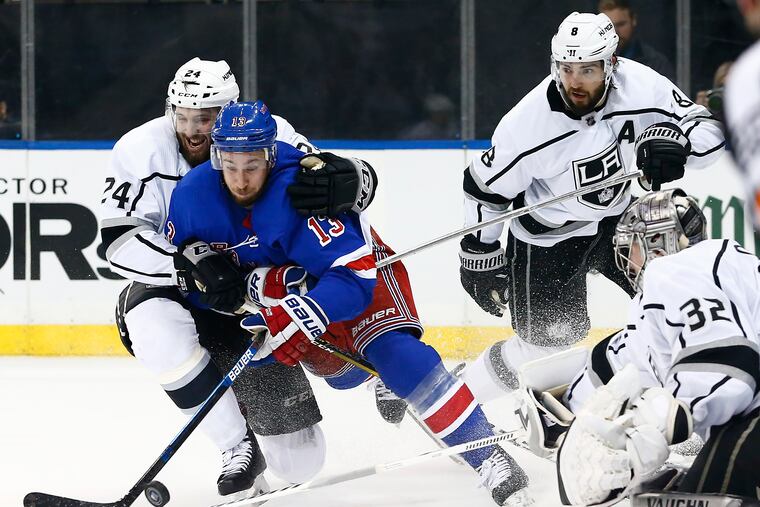The Flyers enter free agency after making a big move for Kevin Hayes. They have to be right. | Mike Sielski
His average annual salary-cap hit is steep. The team better hope that he’s worth it.

Seven summers ago, Chuck Fletcher was at the center of one of the most frenzied free-agency periods that the NHL had ever seen, a time so wild that he can no longer offer the kinds of contracts he and other general managers were handing out back then.
As the GM of the Minnesota Wild, Fletcher got the green light from the franchise’s owner, Craig Leipold, to sign two stars, forward Zach Parise and defenseman Ryan Suter, to the same deal: 13 years and $98 million for each of them. The numbers were staggering, but the strategy had become familiar. The exorbitant length of such a contract allowed a franchise to lower the annual salary-cap hit -- the Flyers had tried something similar with Mike Richards in 2007, signing him for 12 years -- and assured Parise, Suter, and players like them that they would continue to be paid handsomely well after their years of peak performance.
Months later, a new collective bargaining agreement banned such deals, capping a contract’s length at seven or eight years. So, by signing center Kevin Hayes, 27, to a seven-year, $50-million deal on June 19, Fletcher pushed the Flyers as far as they could possibly go -- and as far as Hayes demanded they go.
“That’s really the going term for a lot of these 27-year-olds, and sometimes 28- and 29-year-olds might get five- or six-year deals,” Fletcher said in a recent phone interview. “The good thing with Kevin is that he’ll be 33 at the end of his contract. The Parise and Suter deals, the players will be much older at the end of those deals. We felt (Hayes’ deal) was a market-based term and something the player was pretty adamant in getting to. That’s what he indicated his first priority was going to be going into free agency.”
Here’s the thing, though: Hayes had the Flyers over a barrel, and he and his agents knew it. Fletcher had traded a fifth-round pick to the Winnipeg Jets for the exclusive right to negotiate with him before Monday, when the league’s free-agency period began. No, losing a low-round pick wouldn’t have been much of a tangible price to pay one way or another. But if the Flyers had failed to reach an agreement with Hayes, the perception it would have fostered -- that they couldn’t reel in their biggest free-agent fish -- would have been devastating to a franchise desperate to improve immediately.
The result was a deal with an average annual cap hit of $7.14 million for a player who has scored more than 20 goals just once in his five NHL seasons, and it’s worth comparing Hayes’ contract to those that other free-agent forwards have signed this summer. William Karlsson, 26, who scored 43 goals two years ago, will cost the Vegas Golden Knights just $5.9 million in annual cap space over his eight-year deal. Brock Nelson is 27 years old, 6-foot-3, and 212 pounds. He has four seasons of at least 20 goals in his six-year career, and the Islanders retained him for six years at an average annual value (AAV) of $6 million. They also kept Jordan Eberle, 29, for five years at an AAV of $5.5 million. Eberle has never scored fewer than 18 goals in an 82-game season in any of his nine years in the league.
Now, the Flyers didn’t want Hayes merely for his offense, or relative lack thereof. He kills penalties, has a well-rounded game, and is 6-foot-5 and 216 pounds. They needed more size and ruggedness from their forwards and clearly were willing to pay for it, and in fairness to Fletcher, the entire process of pinpointing which players to sign to long-term, high-value contracts is more fraught with unpredictability than it was before the 2005 lockout, when a player couldn’t become a free agent until after he turned 31.
“You always had the upper hand in the negotiations, and you could control the salary and the term much more,” he said. “Now, you’re dealing with players who get to free agency at a younger age and still in the primes of their careers. They have more leverage, and you have to make tougher decisions.”
Those challenges, though, aren’t excuses, and they don’t blunt the effect of committing so much to a player who never quite meets the measure of so long and expensive a contract or failing to build around such a player. Parise and Suter have yet to deliver even a conference finals appearance during their seven years together with the Wild. The Flyers traded Richards less than four years after banking he’d be their captain, their heartbeat, for a dozen years or more. Claude Giroux and Jake Voracek have been the pricey centerpieces of a franchise that hasn’t won a playoff series since 2012. None of this means that the Flyers were wrong to sign Kevin Hayes to this contract. All of this means that they have to be right.